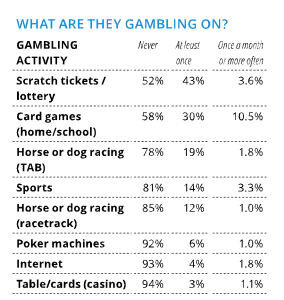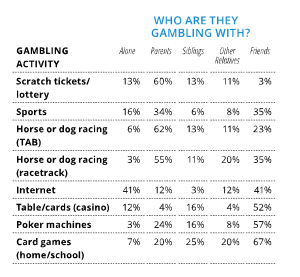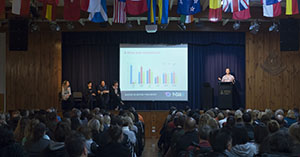A small but worrying number of boys and girls start gambling before they turn 18, and some of them develop problems.
Between 0.2 and 4.4 per cent of Australian adolescents are already problem gamblers.
Research shows that problem gambling risk factors can be related to socio-demographic, personality, psychosocial, substance abuse, gambling, peer, school, and family factors.
Some of these common risk factors include being male, low socio-economic status, extraversion, non-conformity, impulsivity, sensation seeking, under controlled temperament, depressive symptoms, anxiety, impaired coping, life stress, ADHD, substance use, risk-taking, antisocial behaviour, violence, exposure to gambling, peer pressure, school difficulties and family problems.
Deakin University School of Psychology Lecturer Dr Stephanie Merkouris says parents and carers can reduce the risk by talking to young people, looking for problems, limiting internet use and thinking about family attitudes towards gambling and gambling-related activities.
Go to deakin.edu.au
Gamblers Help telephone line: 1800 858 858
Gamblers Help youth telephone line: 1800 262 376
Online support: www.gamblinghelponline.org.au
Raising children: www.raisingchildren.net.au/articles/gambling.html
How Do I Spot Gambling Problems?
- Sudden changes in the amount of money your child has
- Changes in sleep pattern
- Changes in mood
- School absences or falling marks at school
- Decreased social activities and friends (or complete withdrawal)
- Preoccupation with: sports, internet, odds, video arcades, simulated gambling apps and games
- Secrecy about gambling or denial
Protective Factors for Youth Gambling Problems
- Female gender
- Adaptive coping strategies
- Emotional Intelligence
- Well-being
- Self-monitoring
- Personal competence
- Resilience
- Interpersonal skills
- Social competence
- Social support
- Social bonding
- School connnectedness
- Understanding of randomness
- Parental monitoring
- Family cohesion
Young People & Gambling





